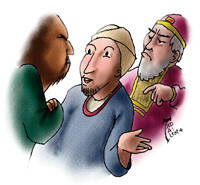Unlikely Leaders
A world-transforming movement was born through the most unlikely leader. One morning in 1995, 12-year-old Craig Kielberger was captivated by the story of Iqbal Masih, a South Asian boy sold into slavery at age 4, who lost his life for speaking out for children’s rights. Craig gathered 10 of his friends, and the movement Free the Children was born. Today it engages over a million children in peer education in 45 countries and has been nominated for the Nobel Peace Prize.
In today’s first reading, we hear of a similarly unlikely choice of a leader. It goes against traditional thinking to look to the youngest to lead into the future. The prophet Samuel was sure that Eliab was the one to be anointed, but God instructed him not to judge by appearance and invited him to see as God does, by looking into the heart.
Today’s Gospel is also about seeing with the heart and about the unlikely leadership of a man who had been born blind. By allowing the works of God to be made visible through him, he becomes able to lead others to faith, even if not all accept his testimony. This same thing can be said of Jesus—he is an unconventional leader in the eyes of other leaders, whose objections and denials end with their refusal to see the works of God being made visible through him.
The man who was blind is open to the simple instructions of Jesus. He allows Jesus to put mud on his eyes, an ancient technique thought to have curative properties, and he obediently goes to the Pool of Siloam, washes and comes back able to see. In the lengthy exchanges that follow, first with his neighbors and then with the Pharisees, the man becomes more and more able to see with his heart, understanding more and more clearly who Jesus is, and grows in his ability to lead others to faith. He moves from not knowing Jesus (v. 12) to recognizing him as a prophet (v. 17), a man of God (v. 31), the Son of Man (v. 38). In the end he worships him as Lord (v. 38).
The other characters in the narrative throw up one obstacle after another, tenaciously refusing to see. The neighbors first debate about the identity of the man, insisting they do not see what they see. When the healed man settles that issue, they shift to the question of how the healing was done. Resisting the explanation of the newly sighted man, they turn to their leaders, who pick up the debate with the question of how the cure was done. The Pharisees latch on to another obstacle: Jesus must be a sinner because he did the healing on a sabbath. When they turn to the healed man for his interpretation, he counters with, “He is a prophet.” Unpersuaded, the leaders then revert to questioning whether there had actually been any blindness. The parents confirm the identity of their son and his congenital blindness but say no more, out of fear.
Coming back to the healed man, the leaders have now made up their minds about what they see: that Jesus is a sinner. They circle back to question the fact of the healing and how it was done. They shore up their certitude about what they know and what they see, claiming their faithfulness to Moses and finally end by dismissing the healed man as a sinner, too. What Jesus does is unheard of (v. 32). The person he calls to lead others to faith is unconventional. The logical arguments why it cannot be so are endless. Those who allow themselves to quell their objections and to see with the heart can lead the way into a transformed future.
This article also appeared in print, under the headline “Unlikely Leaders,” in the March 28, 2011, issue.








